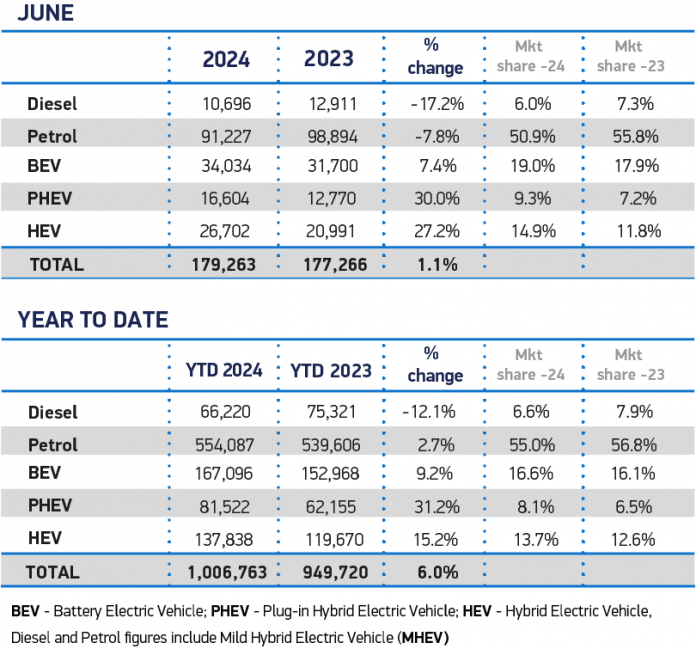The UK new car market has hit the half year million motors mark for the first time in five years, after new car registrations rose in June by a modest 1.1% to reach 179,263 units, according to new figures published by the Society of Motor Manufacturers and Traders (SMMT). As a result, so far in 2024, 1,006,763 new cars have been registered, up 6.0% on the previous year but still down -20.7% on 2019.1
June’s market growth was driven primarily by the fleet sector, where uptake rose by 14.2%, while private retail demand fell for the ninth consecutive month, down -15.3%. Retail buyers accounted for fewer than four in 10 new cars registered (37.7%).
Electrified vehicle uptake continued to grow robustly in June, with plug-in hybrid (PHEV) volumes up 30.0% to reach a 9.3% market share, while hybrid electric vehicles (HEV) rose 27.2% to achieve 14.9% of the market. Both powertrains also outpaced battery electric vehicle growth (BEV), which rose 7.4% but took its highest monthly share this year, accounting for 19.0% of all new vehicle registrations.
The UK’s zero emission transition – and the ability of manufacturers to meet the requirements of the Vehicle Emissions Trading Scheme – currently relies on the fleet sector as private consumer uptake continues to soften. Private BEV uptake has fallen -10.8% year to date, with fewer than one in five new BEVs going to private buyers. Overall, BEVs now comprise 16.6% of the new car market so far this year, slightly above the 16.1% achieved in the same period last year, with uptake behind the levels mandated by government.
Mike Hawes, SMMT Chief Executive, said:
“The year’s midpoint sees the new car market in its best state since 2021 – but this belies the bigger challenge ahead. The private consumer market continues to shrink against a difficult economic backdrop, but with the right policies in place, the next government can re-energise the market and deliver a faster, fairer zero emission transition. All parties are agreed on the need to cut carbon and replacing older fossil fuel based technologies with new electrified powertrains is the essential step to achieving that goal.”
Russell Olive, UK Director, vaylens comments:
“New car sales continue accelerating. And growth is largely driven by fleets and businesses who are shifting towards electric vehicle models (EVs) at speed.
“However, to ignite demand among private consumers and meet the targets mandated under the Vehicle Emissions Trading Scheme, there’s likely going to be more calls for the next government to offer more incentives that encourage drivers to make the switch to EVs too.
“It’s also important to remember the tasks involved in managing more EVs on the road, will be totally different to those involved in managing the fuel supply for petrol or diesel vehicles. For example, businesses will need to use EV charging management software to monitor the status of charging points, track energy use, ensure uptime and smoothly manage payments and reimbursements.
“Today’s figures hint that a lot more work still needs to be done in the underlying infrastructure to address pinch points around how the EV market will function effectively long-term, and shift demand up a gear from drivers on the road.”
‘Vital that UK election ends transition uncertainty’ – Novuna comments
Commenting on the SMMT’s June 2024 new car registration figures Jon Lawes, Managing Director at Novuna Vehicle Solutions, one of the UK’s largest fleet operators, said:
“Businesses need stability and confidence if they are to plan for long-term investment. With the UK heading to the polls, it’s vital the election ends this period of uncertainty on transition goals and provides cast iron EV adoption deadlines.
“There is a long road ahead. Consumers considering the EV switch are contending with affordability hurdles and a dearth of charging infrastructure. Whoever forms the next government urgently needs to adopt a bold strategy to mobilise policy incentives and deploy infrastructure investment.”




